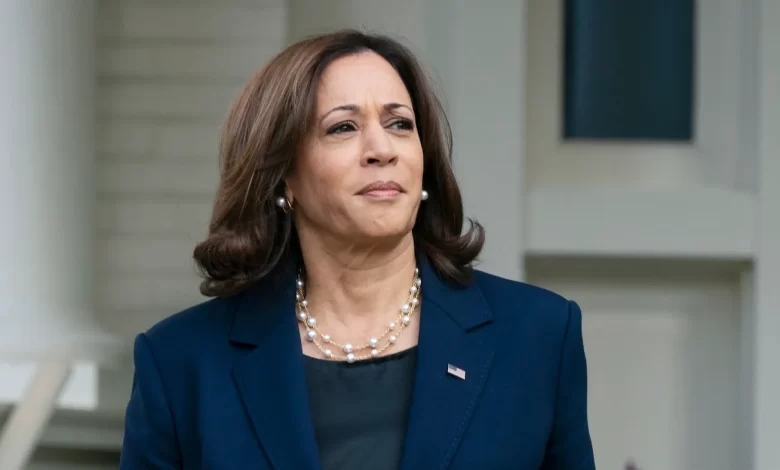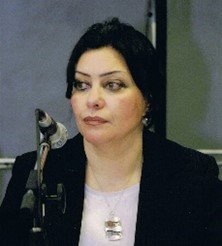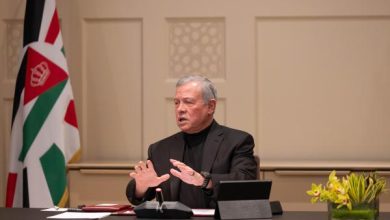

By : Najla M. Shahwan
Jordan Daily – “Yet again, far too many civilians have been killed,” US Vice President and Democratic presidential candidate Kamala Harris said on August 10 after an Israeli air strike on a school in Gaza killed over 100 Palestinians.
She reiterated the White House’s calls for ceasefire and a negotiated hostage deal.
Kamala Harris , who rose through the California political and law enforcement ranks to become the first female vice president in US history, formally secured the Democratic presidential nomination on August 5 becoming the first woman of color to lead a major party ticket.
Since July 21, when President Joe Biden stepped down from the 2024 presidential election, endorsing Vice President Harris as the new Democratic nominee, one question has been on the mind of many : What is the US vice president’s take on the Gaza war and the Israeli – Palestinian conflict ? Biden’s strong support for Israel’s war in Gaza led to a rift between moderates and progressives in his party.
Vice President Kamala Harris offered Prime Minister Benjamin Netanyahu strong support for Israel’s right to defend itself from terrorism but declared that “far too many innocent civilians” had died in Gaza and that “I will not be silent” about their suffering.
In what amounted to her debut on the world stage since her rapid ascension as the presumptive Democratic nominee for president, Harris sought to strike a balance and capture what she called “the complexity” of the strife in the Middle East.
She laid out what she wanted to be a very clear position , speaking to reporters on July 25 after meeting with Netanyahu in a way she has not done after previous meetings with foreign leaders.
Harris started by recalling a history of connection to Israel that dates back to her childhood collecting money to plant trees there, and she ran through her work in the administration.
She has, she said, “unwavering commitment” to Israel, its right to exist and its security. “Israel has a right to defend itself,” she said, “and how it does so maters.”
But while she did not stray from President Biden on policy, she struck a stronger tone on the plight of Palestinians.
And the toll on the Palestinians matters, she said, as she called for everyone involved to push for a hostage release , ceasefire deal, and eventually, a two-state solution.
“What has happened in Gaza over the past nine months is devastating,” she told reporters at the White House complex.
“The images of dead children and desperate, hungry people fleeing for safety, sometimes displaced for the second, third or fourth time — we cannot look away in the face of these tragedies, we cannot allow ourselves to become numb to the suffering, and I will not be silent.”
Moreover, she noted that she had also met with the families of Israeli hostages held by Hamas since its Oct. 7 attack and expressed distress for their anguish, making a point of reciting the names of each of the hostages with US citizenship.
“I’ve told them each time they are not alone, and I stand with them,” she said. “And President Biden and I are working every day to bring them home.”
Harris pressed for the conclusion of a long-delayed cease-fire deal to end the war and bring the hostage’s home-last March ,Harris became the first person in the Biden administration to call for an immediate ceasefire.
Over the ten months since the Hamas attack on October 7 , she has largely stuck close to the president’s position, although at times she has sounded more empathetic about the suffering in Gaza, leading some to conclude that she might not be as supportive of Netanyahu’s war as Biden has been.
Harris has a great working relationship with Israeli President Isaac Herzog, and has been involved in every phone call Biden and Netanyahu have had in the midst of the war.
On the other hand, Doug Emhoff, her husband, is Jewish and has supported the Biden administration’s initiative against antisemitism ever since Hamas group attacked Israel last year.
Besides, it is widely known that she has ties to the American Jewish community and Israeli interest groups.
Moreover, she has won the support of several major Jewish interest groups in her presidential bid, including Democratic Majority for Israel, J Street, and the Jewish Democratic Council of America.
She is also connected to the American Israel Public Affairs Committee (AIPAC).
In 2017, after being elected to the US Senate, Harris spoke at the organization’s annual conference. “I believe the bonds between the US and Israel are unbreakable,” she said at the time.
On various occasions, throughout the ongoing war, Harris asserted that Israel has the “right to defend itself” against Hamas. She also said that the threat Hamas posed to Israel should be “eliminated.”
Besides, she called the condition in Gaza a “humanitarian catastrophe,” and asked Israel to increase the flow of aid to Gaza.
Harris was also empathetic towards students protesting on college campuses across the US, calling for their school to cut ties with Israel. “They are showing exactly what the human emotion should be, as a response to Gaza,” Harris said.
Will Harris shift US stance on Gaza war and the Israeli – Palestinian conflict remains the question !
“Change is coming ’’, predicted Connecticut Sen. Chris Murphy, a member of the Foreign Relations Committee who has been critical of Israel in this period .
“President Biden brought to the White House a lifelong relationship with Netanyahu and a very mature history on the US-Israel relationship,” Murphy said. “This certainly seems to be a moment for a reconsideration of the relationship and for some fresh thinking on how to approach an Israeli political landscape that is lurching further to the right than we could have ever imagined.”
Murphy added, “I think we would all benefit from getting a fresh set of eyes on this conflict and the way that the United States could try to create a viable Palestinian state” , He added.
Vice President Harris, the likely Democratic nominee for president, is attempting to bridge divides within the party over the war in Gaza, emphasizing Israel’s right to defend itself while also focusing on alleviating Palestinian suffering.
Today , young Americans will not vote for further support of Israel’s brutal war on Gaza and Harris understands that generational attitudes on the Israeli -Palestinian conflict have shifted and the US must be steered onto a new path in the region.
She is reflecting a delicate balancing act on one of the country’s most divisive political issues .
However , despite the noticeable difference in tone , it is still unclear what the difference in language means for President Harris upcoming actual policy.
Najla M. Shahwan is Palestinian author, researcher and freelance journalist.She is also Chairwoman of the Palestinian Center for Children’s Literature ( PCCL ) , founder of Jana Woman Cultural Magazine and recipient of two prizes from the Palestinian Union of Writers.
The opinions expressed in this article are those of the writer and do not necessarily reflect the views or positions of the Jordan Daily.

